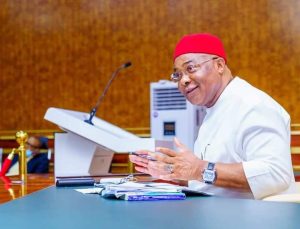Why UNIZIK Keeps Having Acting Vice-Chancellors: A Deep Dive Into the Governance Lapse at Nigeria’s Premier Federal Institution
For observers, students, staff, and alumni of Nnamdi Azikiwe University (UNIZIK), Awka, a perplexing question has persisted over the past few years: Why does the university constantly have Acting Vice-Chancellors (AVCs) rather than substantive ones?
While other federal universities seem to have maintained seamless transitions in leadership and governance, UNIZIK has faced a frustrating pattern of temporary leadership. As of 2025, the university has had multiple Acting Vice-Chancellors in a relatively short time, raising concerns about institutional stability, administrative continuity, and the long-term development trajectory of the school.
To understand the crux of the issue, one must examine the role of the University Governing Council, the responsibilities of the Federal Government in university administration, and the legal and administrative frameworks that guide the appointment of Vice-Chancellors.
As of May 2025, UNIZIK’s Vice-Chancellorship remains under acting leadership. This has been the case since the end of the tenure of the last substantive VC, Professor Charles Esimone, in June 2024. Despite the statutory process requiring the immediate appointment of a new VC through a transparent, competitive selection process overseen by the university’s Governing Council, the process has stalled indefinitely.
The reason is not hidden, nor is it the fault of the university’s internal organs. The situation stems from the failure of the Federal Government—specifically the executive arm led by President Bola Ahmed Tinubu—to fully constitute the Governing Council of the university following the dissolution of all governing boards of federal universities in 2023.
YOU MAY READ
UNIZIK Governing Council Allegedly Debunks Purported Election of Acting Vice-Chancellor
While UNIZIK currently has a Pro-Chancellor and a few internal members of Council (comprising Senate and Congregation representatives), the external members—who complete the statutory requirement for Council operations—are yet to be appointed by the President. Without a fully functional Governing Council, the university is legally incapacitated to carry out the process of appointing a substantive Vice-Chancellor.
In Nigeria’s federal university system, the Governing Council is the highest decision-making body responsible for major policy and administrative decisions, including the appointment of a Vice-Chancellor. According to the Universities (Miscellaneous Provisions) Act and the university’s enabling law, the Governing Council must consist of:
- The Pro-Chancellor (appointed by the President)
- Four external members appointed by the President
- One representative each of the Ministry of Education and the National Universities Commission
- Internal members such as the Vice-Chancellor, two Senate members, one Congregation representative, and one Convocation representative.
The Council’s power includes setting the policy direction of the university, appointing the principal officers, and overseeing the university’s budget and discipline. Critically, the Council is the body that screens, interviews, and recommends candidates for appointment as Vice-Chancellor.
Without its full composition—especially the external members—any attempt to appoint a substantive Vice-Chancellor would be a breach of extant laws and liable to legal challenge.
The roots of the current crisis trace back to 2023 when the Tinubu administration, shortly after assuming office, nullified all governing councils appointed during the Buhari administration, citing procedural errors and political irregularities. While that action may have been in line with the new administration’s reform agenda, the failure to quickly reconstitute new councils has paralyzed many federal universities, including UNIZIK.
In effect, universities were left with leadership vacuums, struggling to function with only the Pro-Chancellors and internal governance structures. For UNIZIK, the situation has been especially detrimental due to the expiration of the then-serving VC’s tenure, which made a Council imperative for appointing a replacement.
YOU MAY READ
Sacked UNIZIK VC, Odoh, Sues Federal University Gusau Over Alleged Denial Of Professorship & Employment
The government’s delay in announcing new council members has left the university in a kind of administrative limbo, relying on acting leadership that, while constitutionally allowed for a short term, cannot offer the long-term vision or legitimacy of a fully appointed Vice-Chancellor.
Acting Vice-Chancellors are usually appointed from among the university’s Deputy Vice-Chancellors or senior academic staff to hold the fort for a maximum of six months or until a substantive VC is appointed. While this provision is intended to ensure continuity, it was never meant to become the norm.
At UNIZIK, the use of Acting VCs has become a recurring problem. Faculty and staff unions have expressed concern that this creates administrative uncertainty and weakens policy implementation. Acting leaders often lack the mandate and confidence to pursue major initiatives, and their legitimacy is sometimes challenged by internal political factions.
Furthermore, acting appointments contribute to a climate of anxiety among senior academic staff who may be interested in vying for the substantive position. The prolonged ambiguity makes it difficult for potential candidates to prepare, lobby, or present their vision for the institution.
For students, the instability translates into policy inconsistencies, delays in project implementation, and a general sense of drift.
A university’s progress is intricately linked to the vision of its Vice-Chancellor. From infrastructure development to curriculum review, staff recruitment, international collaborations, and alumni engagement, a stable, visionary, and legitimate leadership is crucial. Acting Vice-Chancellors, who may hesitate to make far-reaching decisions, often focus on maintenance rather than transformation.
YOU MAY READ
Unizik: Acting Vice-Chancellor Prof. Ikechebelu, Reiterates His Administration’s Commitment to Peace and Academic Excellence
UNIZIK, with over 35,000 students across its Awka and Nnewi campuses, deserves a steady hand at the helm. With projects in limbo, international grants slowing, and policy proposals delayed, the absence of a substantive VC is more than just a procedural hiccup—it’s a development bottleneck.
In the last two years, UNIZIK has struggled to move forward with important projects such as the expansion of its College of Health Sciences, the completion of hostel accommodation facilities, and the implementation of digital learning platforms. The lack of permanent leadership frustrates donors, contractors, academic collaborators, and the university’s Senate alike.
The current situation is also symptomatic of a larger problem within Nigeria’s federal university system: the politicization of appointments and university governance. While universities are meant to be autonomous institutions governed by academic principles and peer review mechanisms, the interference of political authorities has eroded that autonomy.
From Pro-Chancellors to Council members, many appointments are made with more attention to party loyalty and ethnic balancing than competence or educational vision. The frequent dissolution of university councils with changes in government undermines stability and continuity, leaving institutions in perpetual transition.
UNIZIK is merely a high-profile victim in a systemic malaise that affects many public universities. The cumulative cost is a decline in educational standards, poor global rankings, frustrated faculty, and students who graduate into an economy that demands more than they are prepared for.
In response to the prolonged delay, staff unions such as the Academic Staff Union of Universities (ASUU) have repeatedly called on the Federal Government to constitute the Governing Councils of federal universities without further delay. They argue that the absence of these councils not only violates university autonomy but also paralyzes decision-making processes at the highest level.
At UNIZIK, ASUU Awka Chapter has held several press briefings demanding urgent action. According to their chairman, the inability of the university to appoint a Vice-Chancellor because of government inaction is unacceptable. “We cannot continue like this. The future of this university is at stake,” he said.
Alumni associations and student unions have also joined the call, petitioning the Ministry of Education and writing open letters to the President. “We are not asking for favors,” said Chidiebere Nwakamma, President of the UNIZIK Students’ Union Government. “We are asking for what is right, what is lawful, and what is long overdue.”
The solution to UNIZIK’s leadership crisis is both simple and urgent. The President must immediately appoint the external members of the Governing Council to enable the institution to function fully. Once the Council is reconstituted, it can commence the process of appointing a substantive Vice-Chancellor following due process.
The university’s enabling law provides for a clearly defined procedure:
- Advertisement of the vacancy.
- Application by qualified candidates.
- Shortlisting by a Council-appointed committee.
- Interview and ranking of top candidates.
- Recommendation of a preferred candidate to the President (via the Minister of Education) for appointment.
This process ensures transparency, meritocracy, and institutional credibility. But it cannot begin until the Council is fully constituted.
Nnamdi Azikiwe University, named after Nigeria’s foremost nationalist and first President, deserves better. It deserves leadership rooted in law, guided by vision, and supported by functional governance structures. The continued delay in appointing a substantive Vice-Chancellor is a disservice to the university community and a violation of the autonomy promised in the Nigerian university system.
Those asking why UNIZIK is always under Acting Vice-Chancellors should now understand: it is not the fault of the university. It is the direct result of Federal Government inaction. The ball is firmly in President Tinubu’s court. Until he does the needful by appointing external members of the Governing Council, UNIZIK will remain in administrative limbo.
And for a university of its stature and promise, that is simply unacceptable.
Iyke Orji
For those asking why Unizik is always having Acting Vice-Chancellors, here is the why.
The Governing Council has not been fully constituted by President Tinubu. Currently the University has only a Pro Chancellor and internal members of Council. The external members are yet to be appointed following the nullification of the previous external council members.
Once the President does the needful, Unizik will have a substantive VC ASAP through laid down extant laws of the UniversityGnc Chukwuemeka





